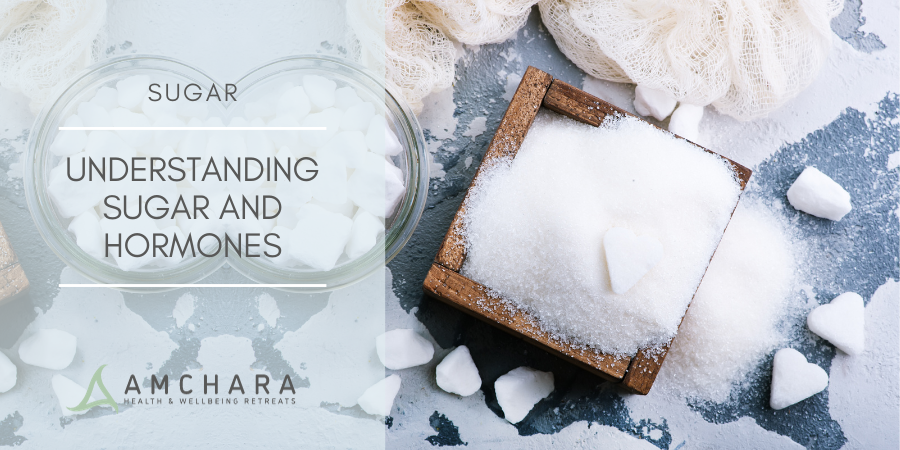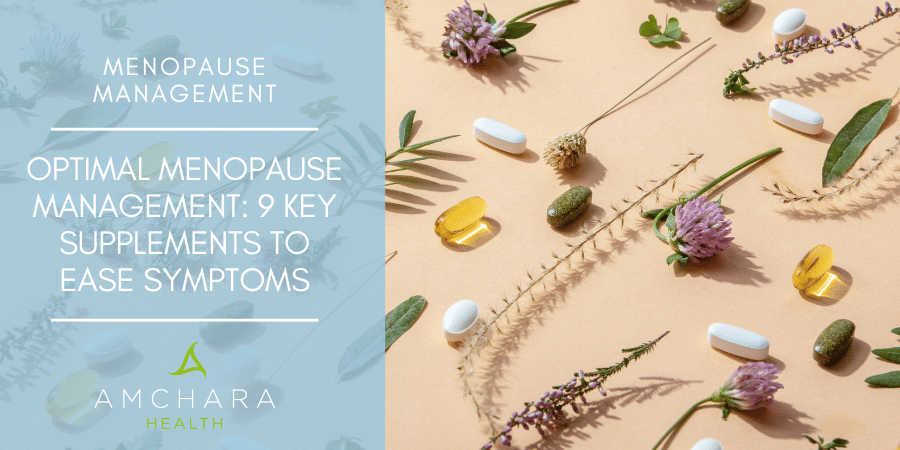Topics covered in this article:
Sugar can be a tempting ‘quick-fix’ choice as it provides your body with a short-term energy boost. However this boost is short-lived, and if you have more sugar than you would usually, your body will produce more insulin to try and keep blood sugar levels balanced. This will mean that blood glucose will be reduced, causing a sudden drop in energy levels (hypoglycaemia), commonly known as a sugar crash, which can cause symptoms such as irritability, fatigue, dizziness and brain fog.
Long term excessive consumption of refined sugar can be a contributing factor in the development of diabetes, obesity, heart disease and many other health conditions, as well as having a destabilising effect on hormonal balance, in fact negatively impacting all hormones produced in the body.
In the modern internet world there is an overwhelming amount of information; it can be hard to find health advice that you can trust, particularly as the main media channels are typically dominated with a single, orthodox narrative. We always take an evidence-based approach, orientated towards a holistic and Personalised Health approach, and aim to provide you with actionable knowledge and tips to help you on your journey to optimal health.
In this article we’ll look at why we choose sugar, how hidden sugars in food could be stacking up your sugar consumption and how to avoid them, and how sugar affects your general health and hormone balance.
Why do we choose sugar?
Sugary drinks, snacks, cakes and sweets are often seen as comfort foods or a ‘reward’, perhaps a way of boosting mood and energy after a bad day.
Some research has indicated that overconsumption of sugar can increase an impulsiveness to eat, and lead to changes in neurobiological functioning in the brain which can lead to changes in emotional states and impact behaviours.
Whilst scientific evidence as to the ‘addiction’ of sugar is inconclusive, it seems likely that excessive sugar consumption is a result of repeated, habitual behaviours and the ‘hit’ of the instant energy boost, as well as the appealing taste of sweetness.
Consuming a small amount of sugar is not overly detrimental to overall health, but there is a caveat as there is a large difference in the effect on the body of different types of sugar.
Natural sugars such as fructose, which occurs naturally in fruit, and lactose found in dairy, are naturally rich in fibre and protein, which work to help your body process the sugars. They also typically contain beneficial plant compounds, as well as vital minerals and vitamins.
Maple syrup and honey are often considered to be a healthier alternative to refined sugar, but whilst they have more nutrients than refined sugar, they contain a lot of sugar and very little fibre so best only eaten in moderation.
If you have a sweet tooth, yakon syrup is a good choice. Made from the root of the yakon plant, native to South America, it has traditionally been used for centuries for medicinal purposes. Studies show that it can improve diabetes as well as helping alleviate kidney and digestive issues, in part because of its fructan content, a type of beneficial soluble dietary fibre.
But too much sugar, especially refined sugars including white sugar, palm sugar, coconut sugar, brown sugar and high-fructose corn syrup, can result in an over-reliance on the ‘hit’ sugar provides, resulting in sugar consumption being habitual and effectively resulting in addictive like feelings.
Avoiding hidden sugars
Refined sugar, made by extracting and processing the sugar that occurs naturally in plants such as sugar cane, sugar beets and corn, is often added to nutrient-poor, processed foods to enhance the flavour and prolong shelf life.
High-fructose corn syrup (HFSC) is another type of refined sugar used to add flavour as well as acting as a preservative and as a bulking agent for processed foods. HFCS has been linked to causing a resistance to the body’s production of the hormone leptin, which tells your body when to eat and when not to eat. This is thought to be part of the reason for the link between sugar over-consumption and obesity.
Names such as fructose, dextrose, lactose, sucrose, starch and glucose can be found on food labels – these are all types of sugar. Check food labels carefully to avoid inadvertently buying these hidden added sugars.
The best way to avoid these hidden sugars is to cook from scratch at home with whole foods.
If you are buying prepackaged, processed food, then be aware that the following foods may often contain added sugar, typically to enhance flavour and/or shelf life:
- 1
Low-fat yoghurt
- 2
Condiments such as ketchup
- 3
Granola
- 4
Cereals
- 5
Energy drinks
- 6
Iced tea
- 7
Stock cubes
- 8
Low fat ready meals
- 9
Bread
- 10
Tinned baked beans
- 11
Salad dressings
- 12
Nut butters
- 13
Fruit juice
How sugar affects health and hormone balance
Refined carbohydrates are broken down into glucose very quickly and consequently released into the blood stream at a high rate.
Sudden surges of glucose prompt the pancreas to release adequate levels of the hormone insulin, which the body needs to chase sugar into the cells.
If the body is constantly required to release insulin, this results in chronically elevated insulin levels, leading to surplus energy which is deposited in the fat cells and stored.
A further problem is that high levels of insulin may cause blood sugar levels to fall too low which then triggers food cravings.
The cycle of sugar highs and lows results in constant peaks and troughs in energy as well as typical symptoms of low blood glucose levels, known as ‘hypoglycaemia’.
Problems develop if this cycle is constantly repeated as over-stimulation of the pancreas can lead to exhaustion and as a result, the pancreas may struggle to produce sufficient insulin leaving high levels of glucose in the blood circulation.
The consequences of this are symptoms of ‘hyperglycaemia’ – abnormally high blood sugar levels – which may lead to a gradual deterioration in overall pancreatic function. Ultimately these unstable conditions can contribute to the development of diabetes, metabolic syndrome and obesity, and other chronic health conditions.
If the pancreas has to release extra insulin, it may impact the ovaries, causing them to produce more hormones such as testosterone.
Over consumption of refined sugar impacts the production of hormones causing hormonal imbalance. This also affects the metabolism, making it less efficient and so contributing to poor energy and poor weight control.
The prevalence of diabetes is growing globally, and some studies have attributed this to highly refined carbohydrate diets.
Chronic kidney disease has also been linked to the consumption of sugar sweetened fizzy drinks.
There is research to suggest that cardiovascular disease, and non-alcoholic fatty liver disease are more likely to occur with a diet filled with sugary and highly refined foods.
With a hormone balance that leans more towards testosterone production there is a risk that it could influence follicular development in the ovaries, which can subsequently affect ovulation. It may also trigger symptoms such as irregular periods, acne or excessive growth of bodily hair.
Poor insulin control is thought to be a major cause of PCOS (Polycystic Ovary Syndrome) with a substantial number of PCOS sufferers affected by insulin resistance.
Cravings for sugary foods during periods can cause significant spikes in blood-glucose levels that trigger the release of the stress hormone cortisol.
The creation of cortisol requires the hormone progesterone which can be easily depleted resulting in an imbalance that might worsen PMS symptoms.
Cortisol is linked to inflammation, potentially increasing the pain and discomfort of menstrual cramps.
Takeaway
Our retreats are designed to help you detoxify both physically and mentally, and our Personalised Health practitioners will support you in a transition to a healthier eating pattern, and empower you to ‘Change for Good’.
On an Amchara health retreat you will be immersed in a supportive and nurturing environment that enables you to switch off, relax and kickstart your health journey, with tailored advice from our Personalised Health practitioners, taking into account your individual health circumstances and goals, and including physical activities and empowering, educational talks.
We provide education on how to improve your relationship with food, and we can offer advice on how to avoid sugar, and make positive nutritional choices based on a balanced diet comprised primarily of natural, unprocessed whole foods, to help you regain optimal health.
Eating plenty of foods such as vegetables, legumes, lean meats and whole grains, and including small quantities of healthy, minimally processed proteins and fats, can help to control your calorie intake without introducing unhealthy hidden sugars onto your plate.
Or why not try Amchara Juicery – cold-pressed, nutritious juices delivered to your door to help you boost your health, naturally. Created by Amchara’s expert in-house health team, you can enjoy a range of fresh, organic juice cleanses (and super soups) at home.




